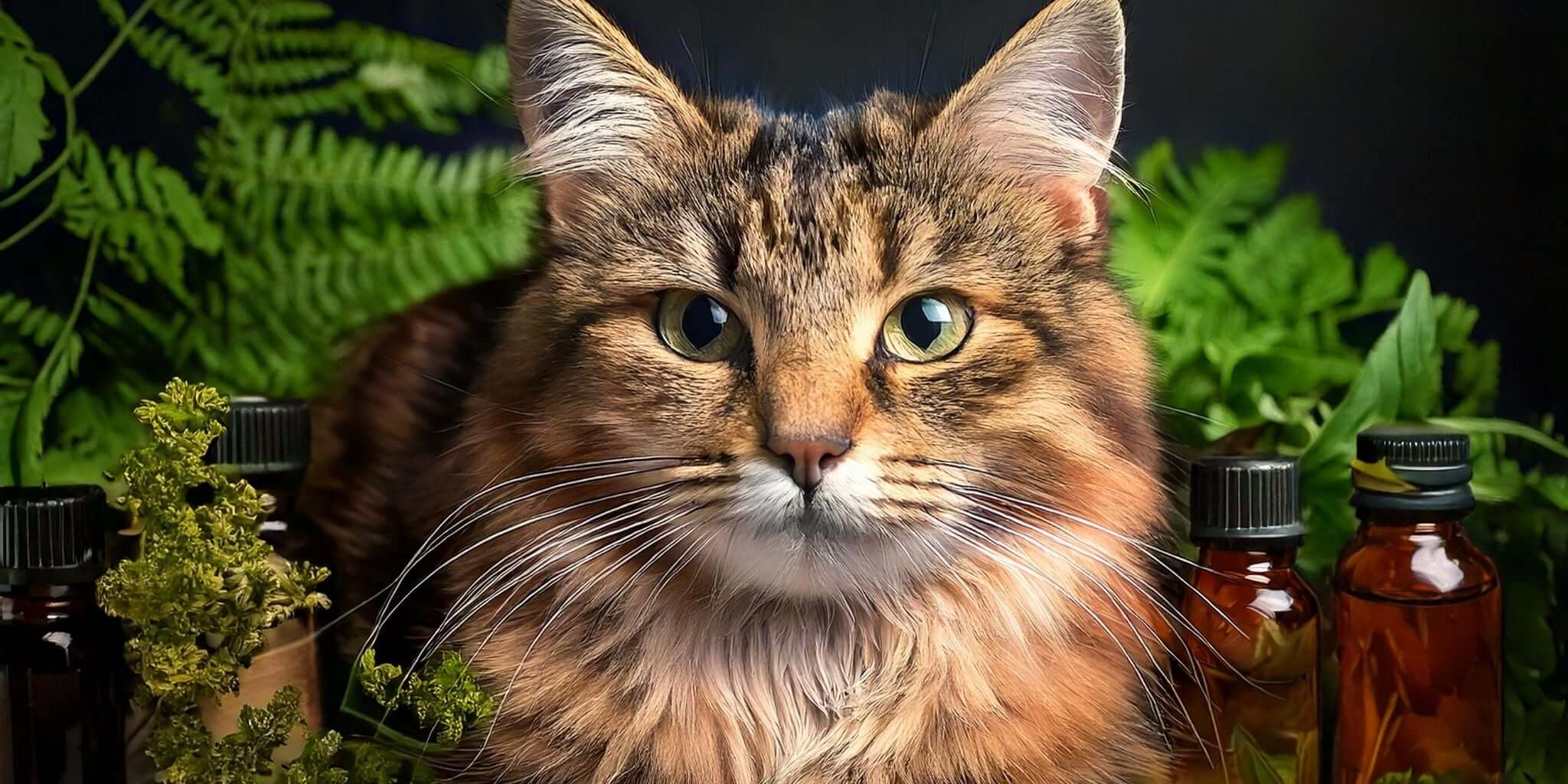为什么草药对猫的健康很重要
猫不仅仅是宠物——它们是家庭中备受喜爱的成员,它们的健康和幸福始终是重中之重。虽然许多宠物主人关注食物、玩具和兽医就诊,但草药的天然功效却常常被忽视。草药可以提供很多好处,从安抚焦虑的猫咪到支持泌尿健康,再到改善它们的皮肤和毛发。
在本指南中,我们将探索对猫安全有益的草药、其用途背后的科学原理以及如何将它们融入猫的日常生活中。无论您是第一次接触草药疗法还是正在寻找优质草药的可靠来源,Sacred Plant Co 都能为您提供一系列值得信赖的猫用安全选择。
了解猫咪的独特需求

猫是专性食肉动物,这意味着它们的饮食主要依赖动物蛋白。然而,如果使用得当,少量草药可以改善它们的饮食和整体健康。以下是您需要了解的内容:
消化敏感性
猫的消化系统很敏感,无法忍受所有的食物或植物。应谨慎适度地引入草药,以避免任何不良影响。
草药的作用
草药不能代替完整的饮食,但可以针对焦虑、消化或皮肤健康等问题提供有针对性的支持。
安全第一
始终优先考虑对猫无害的草药,避免任何可能有毒的草药。从 Sacred Plant Co 等信誉良好的供应商处采购可确保您使用的草药不含有害化学物质或污染物。
草药对猫的益处

在猫咪护理程序中添加草药可以带来一系列益处,从身体健康到情绪健康。草药的功效如下:
- 消化支持: 猫薄荷和茴香等草药可以帮助缓解胃部不适。
- 镇静效果: 洋甘菊和缬草可减轻压力,促进放松。
- 增强免疫力: 紫锥菊可以增强猫的免疫系统,帮助它们抵抗感染。
- 皮肤和毛发健康: 金盏花和迷迭香可舒缓刺激并促进毛发光泽。
- 泌尿健康: 蒲公英和蔓越莓支持肾脏和膀胱功能。
对猫安全的顶级草药及其用途

猫薄荷
- 好处:刺激嬉戏行为并有助于减轻焦虑。
- 用法:将干猫薄荷撒在玩具或床上用品上,以丰富其味道。
洋甘菊
- 好处:缓解压力,促进安稳睡眠。
- 用法:冲泡淡茶或用作酊剂。
蒲公英根
- 好处:支持肝脏和泌尿系统健康。
- 用法:将少量蒲公英根粉添加到食物中。
缬草根
- 益处:缓解紧张、平息过度活跃。
- 用法:与猫薄荷结合或单独使用以达到舒缓效果。
金盏花
- 好处:促进伤口愈合并舒缓受刺激的皮肤。
- 用法:用作外用药膏或浸泡油。
猫咪应避免食用的草药
虽然许多草药对猫有益,但有些草药对猫有害,甚至有毒。以下是一些需要避免的草药:
- 大蒜:导致贫血并损害红细胞。
- 洋葱:毒性很强,会导致严重的健康问题。
- 毛地黄:即使少量也可能致命。
- 精油:浓缩草本油如果被猫摄入或吸入可能会很危险。
安全提示
- 在给猫的饮食添加新的草药之前,请务必咨询兽医。
- 避免给予来源不明的草药,因为它们可能被杀虫剂或其他有害物质污染。
- 坚持与 Sacred Plant Co 等值得信赖的供应商合作,购买对猫安全的草药。
如何给猫咪喂食草药
在给猫咪日常饮食中添加草药时,务必要采取循序渐进、谨慎的方式。方法如下:
慢慢开始
- 从少量的单一草药开始。
- 监测猫的行为和健康状况,留意任何不良反应。
使用正确的形式
- 干草药:非常适合撒在食物或床上用品上。
- 草本茶:凉茶和淡茶可以补充水分并带来温和的功效。
- 酊剂:不含酒精的酊剂易于管理并且非常有效。
频率
- 草药应作为偶尔的补充剂,而不是每日的主食。
安全警告:为猫安全使用草药

虽然草药可以为您的猫带来许多好处,但它们的安全性和有效性取决于正确的使用方法。猫是敏感的动物,并非所有草药对它们都是安全的。为了确保您的猫咪朋友的健康,请遵循以下基本安全准则:
1. 务必使用对猫无害的草药
并非所有草药都适合猫。有些草药有毒,即使少量也会引起严重反应。坚持使用经过验证的、对猫安全的草药,如猫薄荷、洋甘菊、金盏花和蒲公英根。避免使用大蒜、洋葱和毛地黄等对猫有害的草药。
2. 慢慢开始并监测反应
- 从少量开始,逐渐引入草药。
- 注意呕吐、腹泻、嗜睡或行为改变等不良反应。
- 如果您发现任何异常症状,请立即停止使用并咨询兽医。
3. 避免使用精油
精油,即使是从安全的草药中提取的,也会因为其浓缩性质而对猫有害。吸入或皮肤接触会导致中毒。请改用干草药、茶或酊剂。
4. 使用不含酒精的酊剂
如果使用酊剂,请确保其中不含酒精。酒精对猫来说是有毒的,即使是小剂量的。甘油酊剂是一种安全的替代品。
5. 咨询您的兽医
在引入任何新草药之前,尤其是当您的猫咪已有健康问题或正在服药时,请咨询您的兽医。某些草药可能会与药物发生相互作用或加剧特定的健康问题。
6. 从值得信赖的供应商处采购草药
草药不应含有杀虫剂、污染物或人工添加剂。选择信誉良好的供应商,例如 Sacred Plant Co,该公司以高品质、可持续采购的草药而闻名。
7. 用草药作为补充品,而不是替代品
草药旨在补充猫咪的饮食和护理,不能替代兽医治疗或均衡营养。请谨慎使用,并且仅用于特定目的。
如果使用得当,草药可以成为增强猫咪健康的有力工具。始终将猫咪的安全放在首位,使用合适的草药,监测其反应,并在必要时咨询专业人士。
自制猫用草药配方
镇静猫咪零食
草本护肤喷雾
助消化茶
- 材料: 1茶匙茴香,1茶匙蒲公英根。
- 使用方法:冲泡一杯淡茶,冷却后给你的猫喂一茶匙。
猫用草药食谱:简单的 DIY 疗法

在家为猫咪制作草药是一种简单而愉快的增进其健康和幸福的方法。从镇静零食到舒缓喷雾,这些简单的配方使用对猫无害的草药来解决常见的猫咪问题。以下是一些简单易行的配方,您的猫咪一定会喜欢!
1. 镇静猫咪零食
这些缓解压力的草药零食可以帮助您的猫咪放松,非常适合紧张的猫咪或忙碌一天之后的猫咪。
原料:
指示:
- 将烤箱预热至 250°F (120°C)。
- 将干草药和燕麦粉混合在碗中。
- 加入红薯泥和少量水,搅拌成面团。
- 卷成小球或者压成零食形状。
- 将其放在铺有羊皮纸的烤盘上,烘烤 20-25 分钟,或直至变硬。
- 待其完全冷却后即可食用。
服务提示:在压力较大的情况下,例如去看兽医或遇到雷雨天气,提供 1-2 份零食。
2. 助消化茶

这种温和的草药茶可以帮助缓解胃部不适并促进猫的消化。
原料:
- 1 茶匙干茴香籽
- 1茶匙干蒲公英根
- 1杯热水
指示:
- 将茴香籽和蒲公英根放入一杯热水中。
- 让茶浸泡10分钟,然后过滤并完全冷却。
- 根据需要给你的猫喂1-2茶匙冷茶。
食用提示:将剩余的茶存放在冰箱中,最多可保存 3 天。
3. 草本皮肤喷雾,缓解刺激

这种温和的喷雾有助于缓解轻微的皮肤刺激并促进愈合。
原料:
指示:
- 将金盏花瓣和迷迭香叶放入耐热碗中。
- 将沸水倒入草药中,浸泡 15 分钟。
- 过滤液体并让其完全冷却。
- 将草药浸液倒入喷雾瓶中。
- 轻轻喷洒在患处或使用棉球涂抹喷雾。
使用提示:根据需要用于轻微割伤、划伤或皮肤干燥。
4. 好玩的猫薄荷袋

使用这些简单的 DIY 猫薄荷玩具鼓励猫咪积极玩耍并丰富猫咪的环境。
原料:
- 1 汤匙干猫薄荷
- 1小块棉布
- 针线(或织物胶)
指示:
- 将一小块棉布剪成正方形。
- 将干猫薄荷放在中间。
- 将布料折叠到猫薄荷上,然后缝合或粘合边缘以形成一个袋子。
- 让袋子完全干燥(如果使用胶水)后再把它给猫咪。
服务提示:轮换猫薄荷玩具以保持猫咪的参与和兴趣。
5. 舒缓草药燕麦糊

对于皮肤发痒或发炎的猫来说,这种糊剂提供了一种舒缓、天然的解决方案。
原料:
- 1 汤匙干洋甘菊
- 1 汤匙纯燕麦片
- 2汤匙温水
指示:
- 将洋甘菊和燕麦研磨成细粉。
- 与温水混合制成糊状。
- 将少量涂抹到受刺激的部位并停留 5-10 分钟。
- 用温水轻轻冲洗并拍干。
使用提示:根据需要使用,以缓解瘙痒或轻微刺激。
关于自制草药食谱的最终想法
通过在家中制作自己的草药,您可以使用安全、天然的成分为您的猫提供有针对性的护理。这些配方易于制作,并且可以根据您猫的独特需求进行定制。
治疗特定猫健康状况的草药
压力和焦虑
消化问题
- 推荐草药:茴香、 蒲公英根。
- 它们的作用方式:缓解腹胀并改善消化。
泌尿健康
- 推荐草药:蔓越莓、 蜀葵根。
- 它们如何起到作用:预防泌尿道感染和维持肾脏健康。
皮肤和毛发护理
关于猫用草药的研究
研究支持使用草药来改善猫的健康和福祉。主要发现包括:
用天然草药促进猫的健康

草药是一种安全、自然的方式来支持猫的健康,无论您是要解决焦虑、消化问题还是皮肤问题。通过选择 Sacred Plant Co 的高品质、对猫无害的草药,您可以确保您的猫咪朋友享受大自然最佳疗法的好处。






1 评论
Thank you so much for this article on herbs for cats, it is very informative.